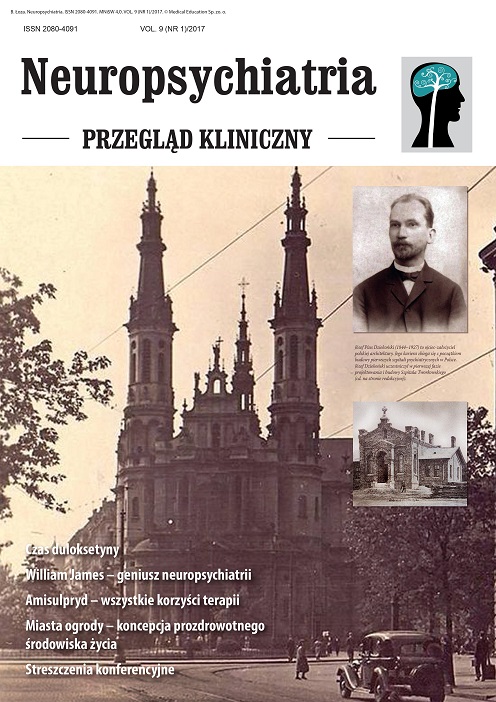Amisulpryd: szerokie spektrum zastosowań klinicznych Artykuł przeglądowy
##plugins.themes.bootstrap3.article.main##
Abstrakt
Amisulpryd jest atypowym lekiem przeciwpsychotycznym stosowanym w leczeniu ostrej i przewlekłej schizofrenii, zwłaszcza z przewagą objawów negatywnych, takich jak spłaszczony afekt i emocjonalne lub społeczne wycofywanie. Amisulpryd jest antagonistą receptorów dopaminowych D2 i D3, z zarówno presynaptyczną (w małych dawkach), jak i limbiczną selektywnością. Ze względu na unikalny mechanizm działania amisulpryd należy do leków przeciwpsychotycznych o największym potencjale klinicznym, jest skuteczniejszy od większości innych neuroleptyków. Amisulpryd to środek dobrze akceptowany i tolerowany przez pacjentów, z bardzo niskim ryzykiem zaprzestania leczenia w porównaniu z ogółem typowych i atypowych leków przeciwpsychotycznych.
##plugins.themes.bootstrap3.article.details##

Utwór dostępny jest na licencji Creative Commons Uznanie autorstwa – Użycie niekomercyjne – Bez utworów zależnych 4.0 Międzynarodowe.
Copyright: © Medical Education sp. z o.o. License allowing third parties to copy and redistribute the material in any medium or format and to remix, transform, and build upon the material, provided the original work is properly cited and states its license.
Address reprint requests to: Medical Education, Marcin Kuźma (marcin.kuzma@mededu.pl)
Bibliografia
2. Kahn RS, Fleischhacker WW, Boter H et al; EUFEST study group. Effectiveness of antipsychotic drugs in first-episode schizophrenia and schizophreniform disorder: an open randomised clinical trial. Lancet 2008; 371(9618): 1085-1097.
3. Boter H, Peuskens J, Libiger J et al; EUFEST study group. Effectiveness of antipsychotics in first-episode schizophrenia and schizophreniform disorder on response and remission: an open randomized clinical trial (EUFEST). Schizophr Res 2009; 115(2-3): 97-103.
4. Storosum JG, Elferink AJ, van Zwieten BJ et al. Amisulpride: is there a treatment for negative symptoms in schizophrenia patients? Schizophr Bull 2002; 28(2): 193-201.
5. Schoemaker H, Claustre Y, Fage D et al. Neurochemical characteristics of amisulpride, an atypical dopamine D2/D3 receptor antagonist with both presynaptic and limbic selectivity. J Pharmacol Exp Ther 1997; 280(1): 83-97.
6. CHPL: Charakterystyka Produktu Leczniczego z dnia 07.05.2012.
7. Amore M, Jori MC; Amisert investigators. Faster response on amisulpride 50 mg versus sertraline 50-100 mg in patients with dysthymia or double depression: A randomized, double-blind, parallel group study. International Clinical Psychopharmacology 2001; 16(6): 317-324.
8. Lecrubier Y, Boyer P, Turjanski S, Rein W. Amisulpride versus imipramine and placebo in dysthymia and major depression. Amisulpride Study Group. J Affect Disord 1997; 43(2): 95-103.
9. Smeraldi E. Amisulpride versus fluoxetine in patients with dysthymia or major depression in partial remission: a double-blind, comparative study. J Affect Disord 1998; 48(1): 47-56.
10. Ravizza L; AMILONG investigators. Amisulpride in mediumterm treatment of dysthymia: A six-month, double-blind safety study versus amitriptyline. Journal of Psychopharmacology 1999; 13(3): 248-254.
11. Boyer P, Lecrubier Y, Stalla-Bourdillon A, Fleurot O. Amisulpride versus amineptine and placebo for the treatment of dysthymia. Neuropsychobiology 1999; 39(1): 25-32.
12. Rocca P, Fonzoa V, Ravizzaa L et al. A comparison of paroxetine and amisulpride in the treatment of dysthymic disorder. J Aff Dis 2002; 70(3): 313-317.
13. Bogorni F, Moreira FF, Pimentel EM et al. Amisulpride Augmentation for Clozapine-Refractory Positive Symptoms: Additional Benefit in Reducing Hypersialorrhea. Case Rep Psychiatry 2015; 2015: 408179.
14. Genç Y, Taner E, Candansayar S. Comparison of clozapine-amisulpride and clozapine-quetiapine combinations for patients with schizophrenia who are partially responsive to clozapine: a single-blind randomized study. Adv Ther 2007; 24(1): 1-13.
15. Zink M, Knopf U, Henn FA, Thome J. Combination of clozapine and amisulpride in treatment-resistant schizophrenia-case reports and review of the literature. Pharmacopsychiatry 2004; 37(1): 26-31.
16. Müller N, Krause D, Dehning S et al. Celecoxib treatment in an early stage of schizophrenia: results of a randomized, double-blind, placebo-controlled trial of celecoxib augmentation of amisulpride treatment. Schizophrenia Research 2010; 121(1-3): 118-124.
17. Thomas P, Vieta E. Amisulpride plus valproate vs haloperidol plus valproate in the treatment of acute mania of bipolar I patients: a multicenter, open-label, randomized, comparative trial. Neuropsychiatric Disease and Treatment 2008; 4(3): 675-686.
18. Torta R, Berra C, Binaschi L, Borio R. Combination therapy with amisulpride and antidepressants: Clinical observations in case series of elderly patients with psychotic depression. Progress in Neuro-Psychopharmacology & Biological Psychiatry 2008; 32(5): 1227-1230.
19. Kranke P, Eberhart L, Motsch J et al. I.V. APD421 (amisulpride) prevents postoperative nausea and vomiting: a randomized, double-blind, placebo-controlled, multicentre trial. British Journal of Anaesthesia 2013; 111(6): 938-945.
20. Torta R, Berra C, Binaschi L, Borio R. Amisulpride in the shortterm treatment of depressive and physical symptoms in cancer patient s during chemotherapies. Support Care Cancer 2007; 15(5): 539-546.

